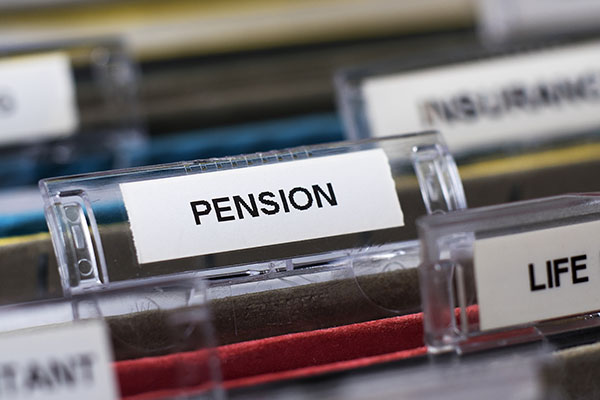How IHT on pensions could impact your retirement choices
With pensions scheduled to enter the scope of inheritance tax from April 2027, Craig Rickman answers some key questions for savers set to be affected by this important change.
7th November 2024 09:36
by Craig Rickman from interactive investor

Among the headline measures announced by Chancellor Rachel Reeves in her Autumn Budget was the decision to scrap the inheritance tax (IHT) exemption on unspent pensions from April 2027.
The policy was flagged as a “soft target” in the lead up to the event, but giving it the green light still proved deeply controversial.
- Invest with ii: What is a SIPP? | Is a SIPP right for me? | SIPP Cashback Offers
Many savers have plumped up their pensions in recent years to harness the IHT-swerving perks, while others have transferred from defined benefit (DB) to defined contribution (DC) schemes for intergenerational wealth planning purposes. Both groups will naturally feel their previously savvy tactics have been thwarted.
Furthermore, Reeves’ move to prolong the freeze on IHT thresholds until 2030 means estates will be hit from both sides: not only will more of your assets be subject to IHT in a few years’ time, the tax-free amount you can pass down will continue to erode in “real terms”.
Over the next two and a half years those impacted by this change will have some vital decisions to make. The estate planning process may require careful rejigging to limit the amount of tax your loved ones are hit with.
Let’s answer some of the key questions you may have about pensions and IHT based on what we know so far.
1) What’s happening and when specifically?
From 6 April 2027, unspent pensions will be brought into the scope of IHT. Currently pensions assets are considered outside the estate and so escape the tax which is levied at a flat rate of 40% on anything that isn’t exempt.
The tricky thing right now from a planning point of view, is that passing away either before or after the point the change takes effect could throw up vastly different tax implications for your loved ones.
2) How many people will this impact?
The government estimates around 49,000 estates a year that have pensions will face an inheritance tax bill, comprising 10,500 dragged into the IHT net, and 38,500 facing a larger tax bill.
- Sign up to our free newsletter for investment ideas, latest news and award-winning analysis
- Is it time to come out of cash? And what to buy now
3) Which types of pension arrangements will be affected?
The short answer is that where there are death benefits, most. It makes more sense to cover what’s not included.
- Any scheme that provides a dependent’s pension, whether DB or DC, will be outside the estate calculation. But any income from these schemes will be taxed at the beneficiary’s marginal rate of income tax
- Any charity lump sum benefits will escape IHT. To note, these are included in the estate calculation but will be IHT exempt provided the payment is made to a qualifying charity.
4) How will my heirs be taxed on inherited pensions from April 2027?
This depends on several factors.
While IHT can apply to pensions whenever you die, if you pass away before the age of 75 the funds can be paid out free from income tax.
If death occurs after your 75th birthday, beneficiaries will pay income tax at their marginal rate on anything taken out. The double whammy of IHT and income tax could mean an effective rate of 52%, 64% or 67% – depending on whether – when added to other income – it falls into the basic (up to £50,270), higher (£50,271 to £125,140) or additional (£125,141+) band.
So, if the value is significant, it might be more tax efficient for the recipient to keep the money in the pension wrapper and wait until retirement, when they have likely dropped to a lower tax band, to start making withdrawals. That said, some may not be afforded this luxury.
5) Will the spousal exemption and tax-free allowances apply?
Yes, they will. If you leave your residual pension savings to a spouse or civil partner, no IHT is payable. It’s only on the second death that IHT comes into play.
However, if you’re unmarried, IHT could apply to whoever you leave the pension to.
In addition, just because pensions are being brought into the scope of IHT, doesn’t mean your loved ones will necessarily pay it. If your total assets on death are below your tax-free threshold, no IHT is levied.
As such, an important task is to calculate your tax-free allowance. Everyone gets £325,000 (nil rate band), and if you own a home that’s left to direct descendants (children, grandchildren, etc), you could get a further £175,000 (residence nil rate band). As these allowances are transferrable to spouses and civil partners, you could pass on up to £1 million tax free.
Due to the complexities here, particularly around the residence nil rate band which reduces by £1 for £2 your estate exceeds £2 million, legal advice to see where you stand will be hugely beneficial.

6) Could my heirs be forced to withdraw pension assets and pay income tax at their marginal rate to foot the IHT bill?
I’ve had a good read of the technical consultation and, while this is possible, it seems entirely avoidable.
The consultation states: “If the beneficiary draws down the inherited pension to reimburse the [estate’s personal representatives] for inheritance tax, they may then also be liable to pay income tax on those funds at their own marginal rate. This can lead to a situation where an additional income tax charge arises on funds which have already been subject to inheritance tax.”
One would hope that the government irons out this potentially painful and deeply unfair anomaly and the best process for reporting and paying IHT is communicated properly well before April 2027. Otherwise, things could get rather messy.
7) Will this lead to people raiding their pensions sooner?
This appears inevitable in some instances. With the IHT-exemption being removed, those wishing to keep their wealth away from HMRC’s grasp may have to revisit their estate planning strategy.
Hooking money out of your pension, such as a self-invested personal pension (SIPP), and either spending it or making gifts to younger generations will become more appealing. But there are things to consider.
First, if your total income for the year exceeds £50,270, you could pay 40% tax on the withdrawal, wiping out the IHT-saving benefits. Second, you might have to survive seven years before the money fully leaves your estate.
One thing we could see is more people draining surplus SIPP money and making third-party pension contributions to younger family members. As the recipient receives an immediate 25% boost - and if they pay 40% or 45% tax claim extra via their tax return – it can be a prudent way to claw back any tax paid on SIPP withdrawals and supercharge loved one’s savings in the process.
Last, raiding your pension to avoid IHT may seem a good idea in practice, but be careful not to jeopardise your retirement lifestyle in the process. Despite the proposed changes, a pension’s core function remains to generate a lifelong income in old age.
8) Current tax guidance suggests I should deplete my individual savings account (ISA) before my SIPP. Should I now swap things around?
Quite possibly. It really depends on what you choose to prioritise in retirement, and whether you die before or after 6 April 2027.
When it comes to your income tax bills, there’s still an argument for taking ISA money first, as their tax-free status on withdrawals means you’ll keep more of the income you receive.
But with regards to estate planning, depleting your SIPP first might be more prudent if you pass away after the IHT changes are introduced.
Let’s look at an example.
Jean dies at age 84 in July 2027. She has a £400,000 SIPP and owns a property worth £1,000,000. She inherited a nil-rate band (£325,000) and residence nil-rate band (£175,000) from a deceased spouse, so the first £1 million of her estate is IHT exempt.
Her only child, John, is the sole beneficiary of her estate.
As her tax-free allowances are swallowed up by the value of her home, John pays £160,000 (40%) IHT on the inherited SIPP, leaving him with £240,000. Jean died after age 75, so future withdrawals will be taxed at his marginal rate of tax.
Because the £240,000 is retained in the SIPP wrapper, it can continue to grow free from capital gains tax (CGT) and dividend tax.
But let’s say Jean has £400,000 in ISAs instead. While IHT will knock 40% off the value, the remaining £240,000 could pass to John and he can take money out without any further tax. And while ISAs can’t cascade down generations - so future interest, dividends and gains are taxable - there’s nothing to stop John from directing the money towards his own tax wrappers over time.
For instance, he could potentially shift up to £60,000 a year (or 100% of earnings if lower) into his own SIPP and gain upfront tax relief at his marginal rate, helping to offset some of the IHT bill. This may also enable John to accrue tax-free cash, which is 25% of total pension savings, up to a maximum of £268,275.
Elsewhere, he could pay £20,000 a year into ISAs and protect any future gains from the taxman. Note, these allowances double up for couples, enabling the inheritance to be tax wrapped sooner.
This is purely an example from an intergenerational tax perspective and must not be construed as any kind of advice. Everyone’s situation is different. What’s suitable for someone else might be harmful to you.
9) What can I do to get ahead of the change?
If the recent saga concerning tax-free cash taught us anything, the first step is to avoid making any hasty, short-term decisions.
Whenever big changes are made to the pension system, it’s important to not only understand how they work, but also how they might affect you.
In the meantime, if you’re confused or concerned, consider taking legal and financial advice, including revisiting your will and expression of wishes in your pension.
These articles are provided for information purposes only. Occasionally, an opinion about whether to buy or sell a specific investment may be provided by third parties. The content is not intended to be a personal recommendation to buy or sell any financial instrument or product, or to adopt any investment strategy as it is not provided based on an assessment of your investing knowledge and experience, your financial situation or your investment objectives. The value of your investments, and the income derived from them, may go down as well as up. You may not get back all the money that you invest. The investments referred to in this article may not be suitable for all investors, and if in doubt, an investor should seek advice from a qualified investment adviser.
Full performance can be found on the company or index summary page on the interactive investor website. Simply click on the company's or index name highlighted in the article.